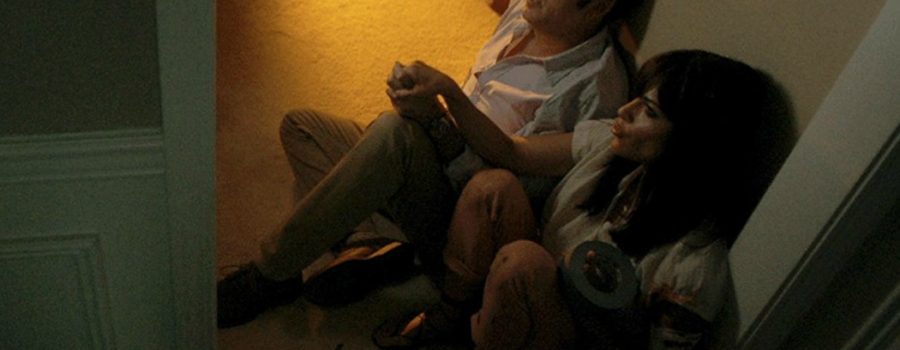I had the opportunity to speak with Taylor about the inspiration behind and the making of Mom And Dad, his unique filmmaking style, what it was like working with two heavyweights like Cage and Selma Blair, his Spielbergian aptitude for working with child actors, and a bit about his new SyFy television series, Happy. Intelligent, articulate, down-to-earth, and humble, Taylor is an all-around good dude and has some wonderful things to share about his work and the work of others.

photo: Phillip Faraone
I really enjoyed your film, Mom And Dad; I thought it was awesome!
Brian Taylor: Thank you! It was fun to make.
Your films have a distinct style, a lot of quick cuts and unique imagery infused in between adrenaline-filled scenes. Where did you develop your style and what and who are your inspirations as a filmmaker?
Brian Taylor: I think a lot of my style just comes from being a generally ADD kind of person. So, I get bored really easily. And I kind of gotta get things really easily. And it’s like, I got it and I want to move on, even though a lot of the movies I watch – I tend to like slower movies; I love slow movies. But somehow when I’m making a movie, I just get bored easily and I just always want to just get to the next thing and get to the next thing.
And a lot of what seems to be fast-paced is actually not necessarily because of that cutting or that type of thing. But it’s more just because of the tonal shift. You know, I always love this idea of being able to go from straight drama to something absurd to something violent to something funny without any real transition to just apply from thing to thing. You know, that’s just always been something that amuses me and it’s fun for me.
You definitely managed to do that seamlessly with this film. What was the inspiration behind Mom And Dad?
Brian Taylor: Well, I’m a parent. You know? I got to think that the feelings of, you know, the angst and the anxiety that Nic [Cage] and Selma’s [Blair] suburban American parents are feeling in the movie is something that’s sort of universal. We love our kids, but there’s this pesky little biological truth that the moment you fulfill your purpose in life by procreating is the moment you suddenly become obsolete. It’s just kind of the way things are designed, and it works really well for, like, fish, right? But for human beings, we have a lot of delusional ideas of our own importance and our own relevance and, that becomes a very hard thing for us to resolve.

source: Momentum Pictures
I can definitely relate to that. You manage to fit in themes of classism and race relations, was it always your intention to explore this in a suburbia setting?
Brian Taylor: Yeah and I mean I don’t think it explores any of them very deeply, but there’s a lot of things in there that just kind of become – there’s a lot of probes used to just give you sort of like an instant read of what the situation is so that we can move on kind of thing. But yeah, all of that kind of stuff is there for a reason and it’s all intentional.
I would say Selma Blair and Nicolas Cage are perfect casting. Did you always have those two actors in mind to play the leads, or did they sort of fall into place as the project developed?
Brian Taylor: I didn’t write it with any particular actors in mind. But definitely Nic was the first guy that obviously – he was the guy that makes the whole movie make sense, right? And what he brings to it – what Nic brings to any movie, it takes the movie to another level. But in the case of this one, he responded so strongly to the material, and he sort of got it and personalized it and put so much of himself into it that you just can’t imagine anybody else doing the role.
And Selma is someone who I’ve wanted to work with forever. She actually auditioned for Crank so many years ago, and I was always just so blown away by how funny, smart, and dexterous that she is with tone, which is kind of perfect for me. But I don’t think I realized exactly how good she was, you know, until – I knew how good Nic was because I worked with him before – but I didn’t know how good Selma was until we got her on set. And man, I mean she does about five performances in one on this movie. And the way that she’s able to move from heartbreaking, to scary, to silly just on a dime is something that I don’t know many actors could really do. I mean she’s really, really amazing in the movie, I think.
And they do have great chemistry together. It’s hard to believe that Nic and Selma have never worked together before. It seems like they should be like, you know, the Cary Grant and Irene Dunne of our time, right? Or maybe the Fred [Astaire] and Ginger [Rogers].
Yeah! Speaking of Nicolas Cage, we see a delightfully unhinged version of the actor, filled with opportunities for classic Nic Cage moments. And we see, like you said, Selma Blair probably show the most range at least that I’ve seen in one of her films. Did you give these two leads a lot of free reign during shooting?
Brian Taylor: Yeah. The great thing about the three of us working together is – and in any kind of situation – you just want everybody to be on the same page; you run into trouble when everybody is trying to make a different movie. So, with Nic and Selma and myself, I just felt like, on a fundamental level, we were just making the same movie. We all knew what we wanted out of it, we were all laughing at the same jokes, and so then it becomes really easy – the performance part of it becomes really easy because you know when you have it.

source: Momentum Pictures
But both of those actors – I mean they’re really creative, and they bring a lot. Nic brings a lot in the movie, into any movie and including this one that’s not in the script. So, yeah, I mean I guess [with] a guy like Nic or an actor like Selma, I give them a lot of free reign because they’re great, you know? And you want that creativity and you want everything to be free.
You got fantastic performances out of Anne Winters and Zackary Arthur as the children.
Brian Taylor: Yeah, those kids are awesome, man. I mean they’re just awesome. I mean Zack Arthur, both of those kids are gonna be big stars.
Yeah. And for someone as young as Zack Arthur and some of the other children in the film, how was it working with them with such violent subject matter? I imagine it takes some finesse and sensitivity.
Brian Taylor: It does. I love working with kids. I mean that’s the Spielberg in me, right? Like, you don’t see any Spielberg in my filmmaking, unfortunately, but the one Spielbergian thing I can say is that it’s really fun for me to work with young actors in these performances. I mean, they don’t have a lot of the same insecurities that they’ll develop later in life. They’re still very natural. And Zack was great. I mean Zack is method, man. That’s a little method dude, you know, and he would work himself to tears in those scenes and how it would take him a while to come back down.
And there were definitely moments in the end of the movie where Nic is in his maximum werewolf mode where Zack was legitimately scared; I mean he was scared of this guy. So, the scare that you’re seeing on his face, it’s not acting, it’s pure terror. And when you’re the director for these young actors, you’re sort of like a temporary parent for them. You’re a little bit of a parental figure, and they trust you. And there were definitely moments where Nic was revving himself up to some terrifying thing and Zack would look over at me, like “is this going to be okay?” And all I could do was just shrug and say like, “I don’t know. I don’t know.”
Could you speak a bit about your new show SyFy show you developed, Happy, with Christopher Meloni and Patton Oswalt?
Brian Taylor: Well, it’s based on a graphic novel by Grant Morrison, which was actually a little bit Crank influenced. So it’s an interesting thing that I ended up getting involved in it because I don’t think any of us really realized how Crank-ish it really was until we got in and start doing it. But, yeah, it’s really fun. TV is the Wild West. You can get away with things on TV that you can’t get away with in movies anymore. It’s just been a lot of fun and Chris Meloni is a revelation in the show. I mean his performance in the show is so cool that it’s just fun to be around.
Yeah, I bet, he’s fantastic. You’ve had a creative burst; with Mom And Dad and Happy, these are your first two projects in 6 years and you haven’t lost a step as a filmmaker. What’s kept you going, creatively?
Brian Taylor: You know, the only reason that we’re doing this is to make cool stuff. So, we’re always just striving to make cool stuff. That’s all I can really say. When you’re not making movies, you just kinda feel like, “Why am I here?” You just gotta stay hungry, man. There’s a lot more where that came from.
Awesome. I look forward to it. And I look forward to seeing Happy as well.
Brian Taylor: I think you’ll like it.
And congratulations on both of your projects. Thanks, Brian. I really appreciate your time and your insight.
Brian Taylor: Thank you! Anytime.
Film Inquiry would like to thank Brian Taylor for his interview and sharing some of his knowledge and love of film with us.
Mom And Dad opens theatrically in the U.S. on January 19, 2018. For more information on release dates, see here. Read our review of Mom and Dad here.
Film Inquiry supports #TimesUp.
“The clock has run out on sexual assault, harassment and inequality in the workplace. It’s time to do something about it.” Read the Letter of Solidarity here. Make a donation to the legal fund here.








Leave a Reply
Your email is safe with us.